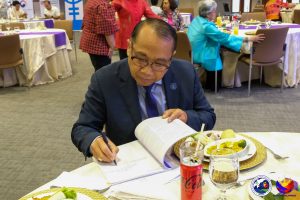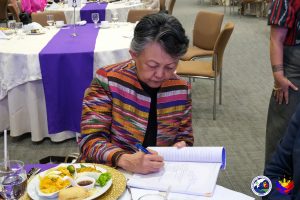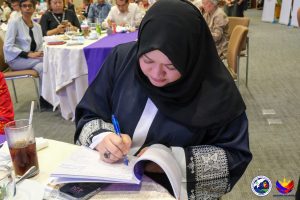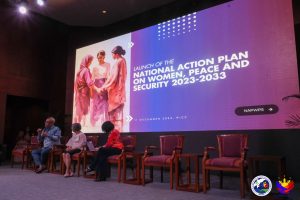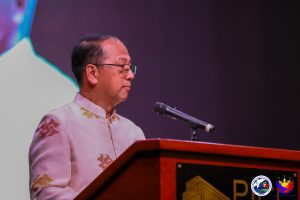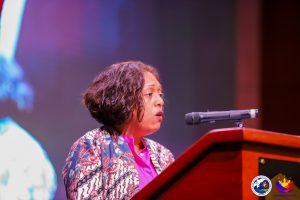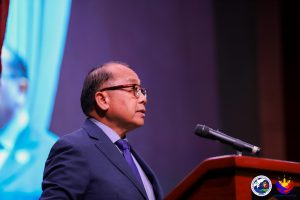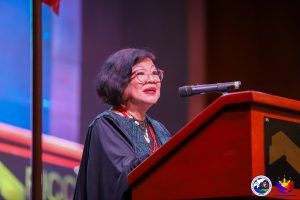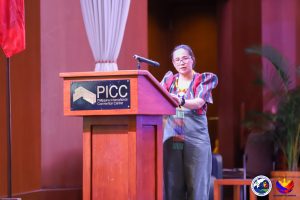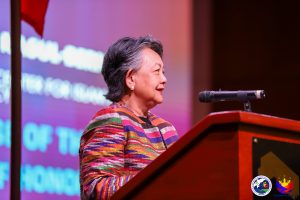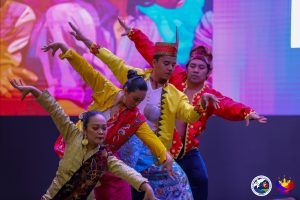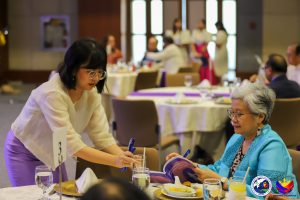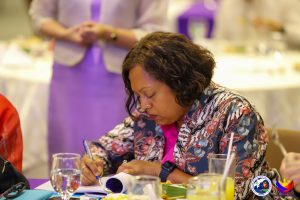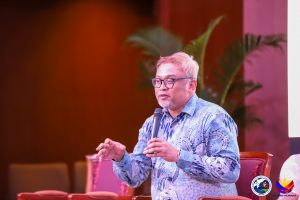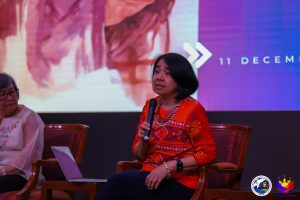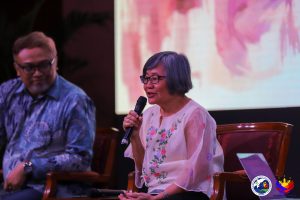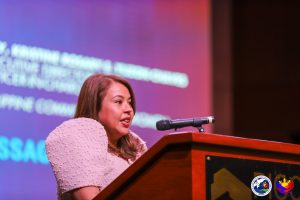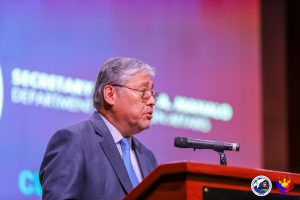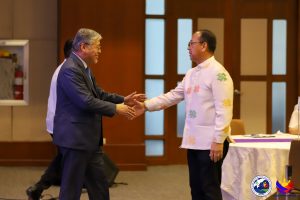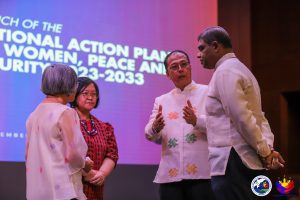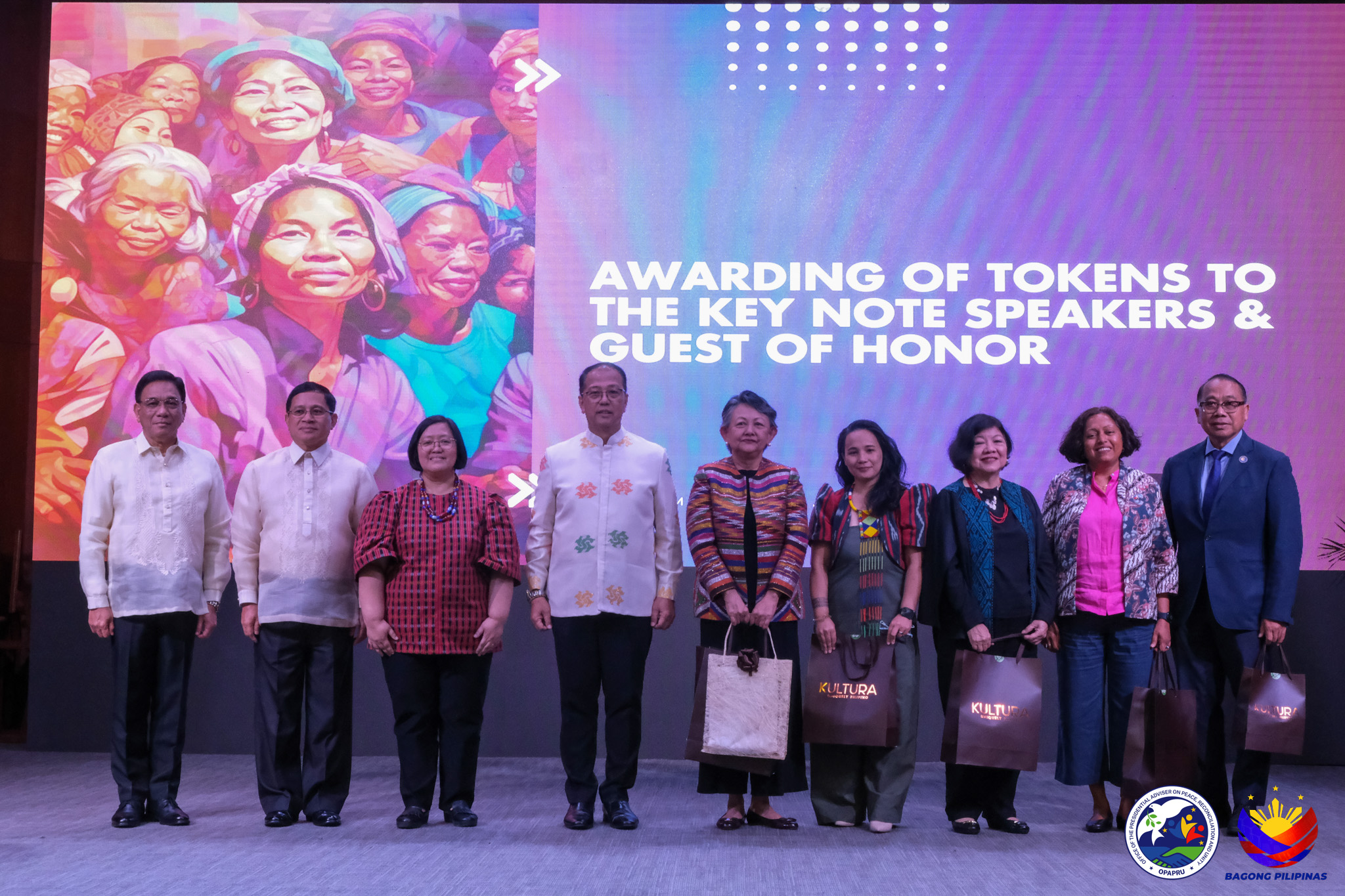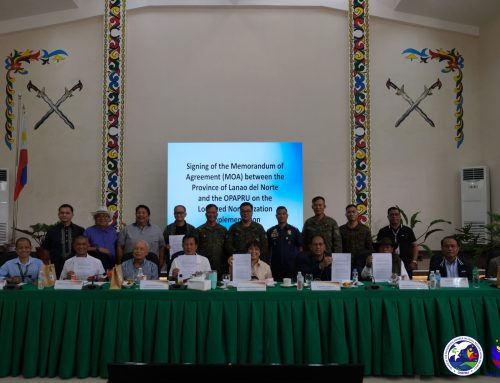PASAY CITY (11 December 2023) – The Office of the Presidential Adviser on Peace, Reconciliation and Unity (OPAPRU), together with the Philippine Commission on Women (PCW), as well as civil society organizations and the international development community, launched on Monday, December 11, the fourth generation of the National Action Plan on Women, Peace, and Security (NAPWPS) 2023-2033.
The NAP WPS is the Philippine government’s commitment to the United Nations Security Country Resolution (UNSCR) No 1325, which calls for women’s participation in conflict prevention and resolution, peace negotiations, peacebuilding, peacekeeping, humanitarian response, and post-conflict reconstruction.
In her keynote speech at the launching ceremony, Philippine Center for Islam and Democracy President Amina Rasul-Bernardo underscored the importance of NAP-WPS, particularly in empowering women as decision-makers and peacebuilders in the country.
“[G]lobally, the role of women in peace processes and decision-making has often been underestimated. Fortunately in the Philippines, we have empowered our women and this national action plan will continue to rectify the imbalance by ensuring women participate in shaping our nation’s destiny,” she said.
“By empowering women in decision-making at all levels, we lay the groundwork for a more comprehensive and sustainable peace,” she added.
In his remarks, Foreign Affairs Sec. Enrique A. Manalo noted that the new NAPWPS “is woven with success stories, inspirations from our national experience and history, and aspirations for prosperous, inclusive, and human communities of our land and shores.”
Ambassador I Gusti Agung Wesaka Puja, Executive Director of the ASEAN Institute for Peace and Reconciliation (ASEAN-IPR), recognized the Philippines government’s efforts in integrating women’s issues in the nation’s peace process.
“In ASEAN, no doubt the Philippines has always been at the forefront in championing issues regarding women and gender, and the completion of this 4th generation NAPWPS continues to be the trailblazer on the WPS agenda advancement,” Puja said.
“We continue to look up to the Philippines as the leader in women’s rights and women’s participation, leadership in peace, security policies and programs. We hope that other ASEAN member-states will also follow suit,” he added.
For her part, Norul Mohamed Rashid of the UN Women, pointed out that the latest version of the NAPWPS is a shining example of “how the Asia-Pacific region has made remarkable strides in advancing the WPS agenda. It comes at a juncture in our world where we are seeing more negative trend lines on the WPS goals.”
“The Philippines has led the way to demonstrate the transformative potential of the WPS agenda and why women’s full, equal and meaningful participation should be the norm and an imperative, and not just an afterthought,” she stressed.
PH commitment to women’s participation in peace process
The Philippines is the first country in Asia that has crafted an action plan in response to the UNSCR 1325. Its formulation was a result of collaborative efforts between the government and various civil society organizations that started in 2007.
In 2010, after multiple rounds of regional consultations, the Philippines launched the first national action plan on women, peace and security in the country and in Southeast Asia.
Additional improvements aimed at streamlining the NAPWPS action points and indicators led to the development of its second generation framework in 2014. This framework was used in 2015 for the baseline research on the implementation of the NAPWPS initiatives.
For its third iteration, the NAPWPS incorporated the Convention on the Elimination of all forms of Discrimination against Women (CEDAW), CEDAW General Recommendation 30, and 2015 Global Study on the Implementation of UNSCR 1325. These underscored women’s leadership and participation in the peace process as well as its strengthened mechanisms for women’s protection during and after conflicts.
Meanwhile, the fourth generation of the plan highlights women as active agents of peacebuilding and transformation rather than passive actors or victims of conflicts.
Consultative, inclusive process
In his remarks, Presidential Adviser on Peace, Reconciliation and Unity Sec. Carlito G. Galvez, Jr. emphasized the collaborative process that resulted in the development and completion of the fourth NAPWPS.
“At the core of the NAPWPS was an inclusive, holistic and wide-ranging consultative process. It took into account the views, experiences and recommendations of all our stakeholders, making this plan an amalgamation of ideas,” Galvez said.
According to the peace adviser, the latest iteration of the NAPWPS is in line with the OPAPRU’s “efforts to ensure greater gender inclusivity in the crafting of more robust, effective and responsive peacebuilding and development strategies.”
Galvez said the new plan also focuses on “gender diversity, men and boys, climate action, cyber and maritime security, outward-looking approaches, and strengthened CSO participation.”
He explained that although the plan is focused on addressing the primary needs of women, it is “highly dynamic” and “was developed to respond to the emerging realities.”
Galvez called on the agency’s peace partners to help ensure the successful implementation of the fourth NAPWPS, saying “with your steadfast support, we are confident that we will realize the plan’s objectives.”
“Thank you for your invaluable contribution in this multi-sectoral effort. We look forward to working with you, as we roll out the NAPWPS across the country,” he concluded. ###

